Why are you leaving your current job is a question that many interviewees are nervous about. After all, the answer that you may want to give can reflect badly on your previous company, yourself, your coworkers, or something else.
And that’s the reason why you are being asked that question. It’s a hard one to answer and the job of the hiring manager is to strip away the veneer to find out what you really are like.
So, let’s explore what you should say, what you shouldn’t say, and how to say it. Ready? Let’s go!
- Why Employers Ask Why You Want to Leave Your Current Job?
- How to Explain Your Reasons for Leaving a Job – Some General Rules
- Why It’s Important to Avoid Negativity
- What’s a Good Reason for Leaving a Job?
- Important Considerations When Answering
- What You Should Say as a Reason for Leaving a Job
- What Not to Say as a Reason for Leaving a Job
- In Closing
Why Employers Ask Why You Want to Leave Your Current Job?
Employers ask about your reasons for leaving a current job to find out about your career ambitions and if you are aligned with their company’s goals.
They’re keen to understand what drives you and how these motivations align with them. By sharing your career goals, you provide them with insight into your future aspirations and how you envision your path within their company.
It helps them assess whether their culture and the role on offer can provide the satisfaction and engagement you’re looking for.
Employers also use your explanations to evaluate if you’re likely to be a good fit for their team and if you’re seeking a long-term commitment.
They’re interested in hiring candidates who aren’t just looking for a stopgap but are invested in growing with the company.
Your reasons for leaving a previous role can shed light on your professional maturity and readiness for the new challenges ahead.

How to Explain Your Reasons for Leaving a Job – Some General Rules
The most important rule to remember is that whatever you say, you have to do so in a way that casts a positive light on your decision. (Obviously this isn’t going to work if you have been fired, but we’ll get to that later.)
Share how your current role has paved the way for this next step, showing your dedication to growth and service to others.
Keep your explanation short, highlighting your enthusiasm for new opportunities that align more closely with your long-term career goals.
Basically, show yourself. But show the best version of yourself.

Why It’s Important to Avoid Negativity
Maintaining a positive tone about your current job during interviews can greatly impact your professional reputation.
When you’re leaving a job, it’s tempting to focus on the negatives that are driving you away. However, avoiding negativity and concentrating on the positive reasons for your departure can set you apart as a professional dedicated to growth and positivity.
Avoiding negativity isn’t just about keeping a professional image; it’s about showcasing your ability to adapt and thrive in any circumstance. Potential employers are keen to see how you navigate changes, and focusing on the positives of your experience, rather than the reasons for leaving, can impress them.
Your answer should highlight your desire for growth, learning, a new challenge, and contributing to a new team, rather than dwelling on any negative aspects of your current role.
Focus on you, not them. Don’t go in with a chip on your shoulder. The interviewer will almost definitely try to agitate it and that won’t show you off in a good light.

What’s a Good Reason for Leaving a Job?
Although we are talking here about the interview, it’s important to take a step back and ask yourself why you actually want to leave your current job. This helps you be able to craft a better answer when the time comes to answer it in an interview.
Important Considerations When Answering
There are a few different things to bear in mind in the overall picture when it comes to answering why are you leaving your current job:
Be Clear about Your Reasons for Wanting to Leave
Below you will find some of the most common reasons why you may be leaving. Whatever one you choose, be clear about it. The worst thing to do in an interview is to stutter over your answer. If you aren’t clear about yourself, how do you think the interviewer is going to be clear to hire you.
Keep Your Answer Short
There may be a completely amazing backstory that goes along with your reason for leaving. Some people do like the sound of their own voice. However, this isn’t the time for it. That’s for the water cooler.
The interviewer wants a short, clear explanation. If there is something missing, you are going to be prompted into saying that. However, you don’t want to go on for more than about 30 seconds for this interview question.
Stay Positive
Ultimately, you are seeking new challenges and growth opportunities. And that is impressive. You want to grow in your career and do something positive with your life. Even if you have been fired, you are still attending this interview.
So, keep up the positive mindset. It helps you answer any question better.
Be Honest without Being Too Detailed
Say what you need to say, but don’t go into the smallest details. When you’re asked why you’re leaving your current position, opt for honesty with a concise explanation.
Aim for respectful communication that balances truthfulness with discretion.
By avoiding unnecessary details while staying truthful, you maintain a constructive conversation tone.
Keeping your response focused and relevant shows your ability to engage in effective, professional dialogue, leaving a favorable impression.

What You Should Say as a Reason for Leaving a Job
Below you will find a list of common reasons to use when answering why are you leaving your job. This is by no means the be-all and end-all. If you have any others to add, feel free to do so in the comments section below.
I’m Looking for Career Growth
When using this example, you are showing that you are enthusiastic about taking on more responsibilities and developing your skills further.
It’s a sign you’re enthusiastic to take on more responsibility and enhance your skills.
Expressing your interest and desire for career growth is a positive reason for moving on from your current job. Your ambition shows a commitment to professional development, showing you’re ready for more challenges and advancement.
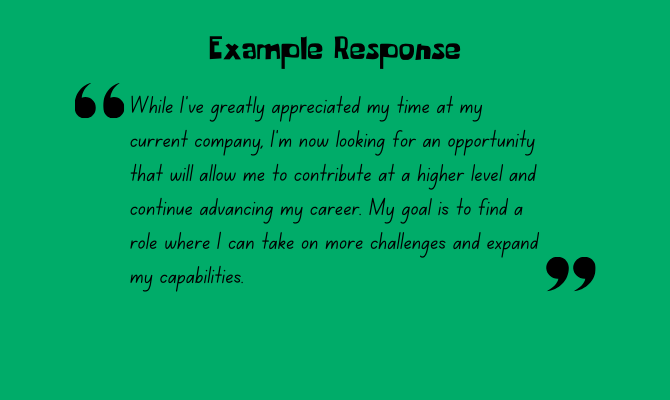
I Want to Change Career Paths
If you’re interested in changing career paths, it’s crucial to explain your reasons thoughtfully during interviews.
Emphasize your enthusiasm to explore new interests and opportunities that better suit your personal goals and strengths.
Framing the change as an opportunity for greater job satisfaction and personal growth can make your motivations more compelling.
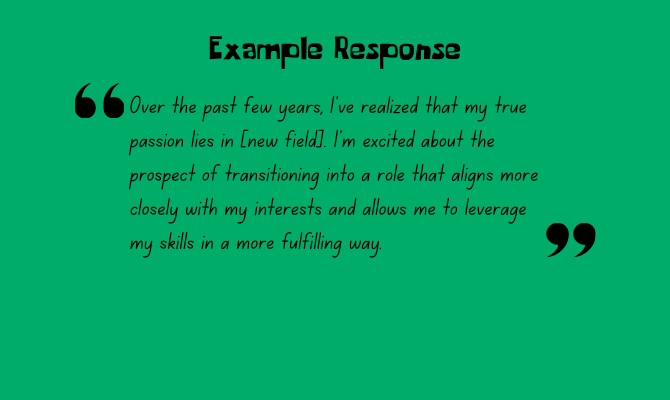
I Want to Pursue a Better Opportunity
This might be the reason why you are leaving. However, you have to be super clear as to what the opportunity you are going to get is and why it’s not an opportunity that you are going to get at your current place of work.
This may be a standard answer, but it has to fit into to something else as well in order to really demonstrate to the interviewer why they should hire you.
When you’re ready to leave your current job for a better opportunity, it’s essential to articulate your reasons clearly.
You might say you’re seeking a role that offers more responsibility and the chance to grow professionally.
It’s also fair to express your desire for a position that provides a healthier work-life balance, underscoring your commitment to both career advancement and personal well-being.
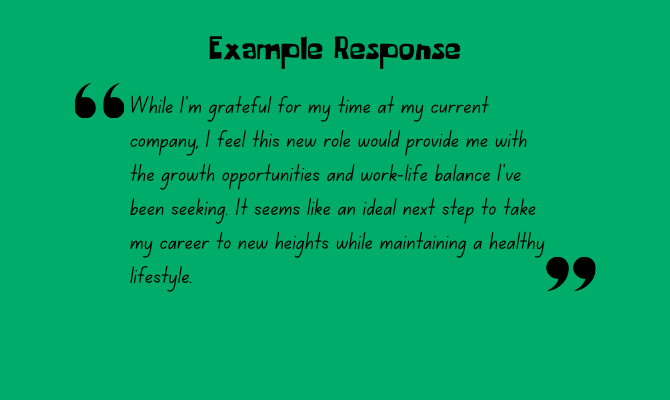
I Left to Pursue an Advanced Degree
Leaving your job to pursue an advanced degree is a bold step toward enhancing your career prospects. It shows you’re committed to gaining deeper expertise and skills in your chosen field.
This move isn’t only about personal growth but also about positioning yourself for future opportunities at companies that demand a higher level of qualification.

I Was Offered a Job by a Former Colleague
Although at first glance this doesn’t sound like a great answer and a bit of “jobs for the boys,” the truth is that if you frame the answer correctly, it can show you off in a very good light.
It is a clear sign of your strong professional relationships and reputation in the industry. This opportunity not only shows your networking prowess but also opens the door to career advancement and collaboration in a familiar environment.
It’s a chance to leverage your past connections for significant professional growth.

I Was Let Go or Being Laid Off
If you were laid off due to company restructuring or downsizing, it’s important to frame it positively. Emphasize that the decision was not performance-related and express your enthusiasm to embrace new opportunities.
Stress that you’re actively seeking new opportunities to serve and grow.
Highlight the positive experiences and skills you’ve gained, showing your resilience and readiness to contribute meaningfully to your next role.
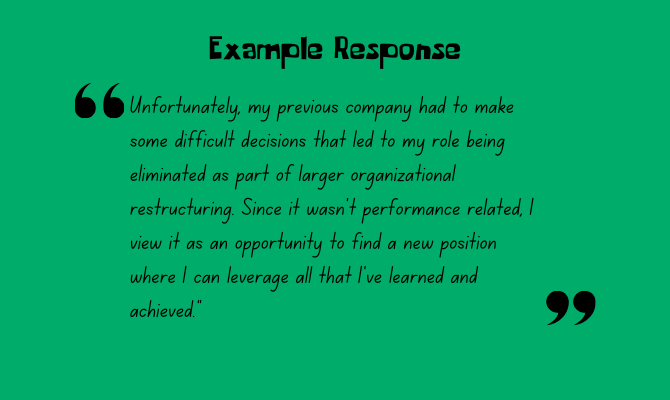
Limited Growth Potential
If the reason that you are in this interview is because where you are now you feel that you have limited growth potential, you’re not alone.
Expressing a desire for a role that offers more challenges and responsibilities is a significant and professional reason for pursuing a new job. It shows your ambition, and you should be lauded for that.
A work environment that values professional development and offers ample room for career growth is essential for my personal and professional satisfaction. It’s where I perform at my best and am able to give more to the company in this way.
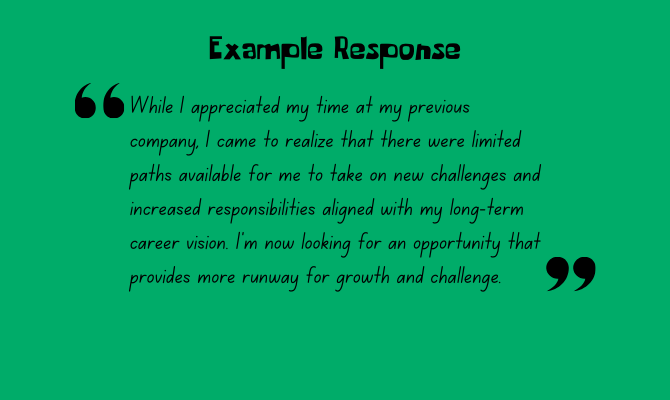
Unsteady Leadership
Facing unstable leadership can greatly impact your job satisfaction and growth opportunities. If you’re looking for a role where leadership is steady and supportive, it’s essential to express this need clearly when discussing reasons for leaving your current position.
Emphasizing your desire for a collaborative environment with clear direction and effective communication from leaders will set the stage for finding a more fulfilling job.
Bear in mind that even if you feel that you have to talk about your current/old employer, don’t go overboard.
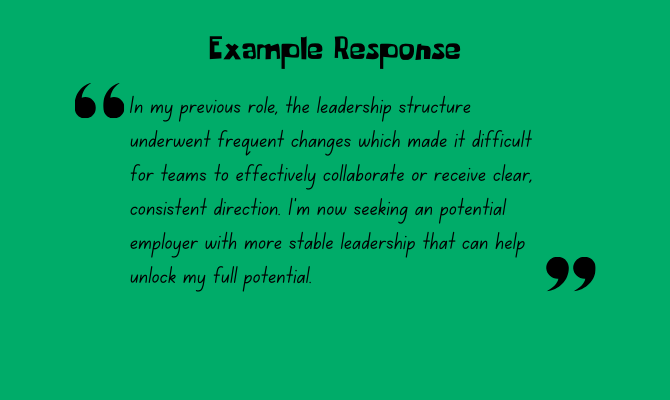
Poor Work-Life Balance
When you’re contemplating leaving your job due to poor work-life balance, it’s essential to articulate your reasons thoughtfully to your prospective employer.
Mention that you’re seeking a role that supports your well-being by offering a healthier balance between work and personal life.
This approach shows your commitment to personal growth and professional efficiency, without casting negative light on your current employer.
A poor work-life balance often leads to burnout, making it a valid reason for seeking a new job opportunity.
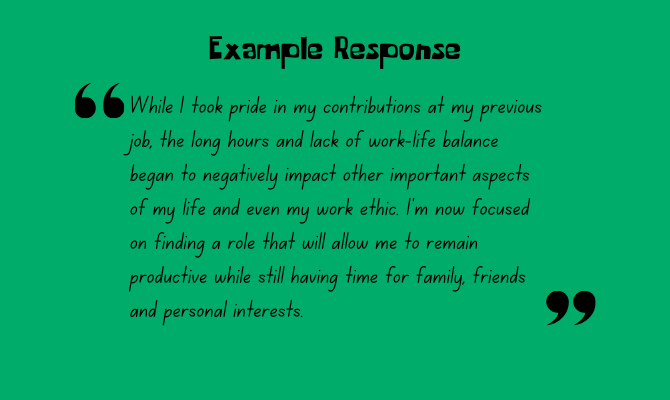
Desire to Explore a New Field or Industry
You might feel that you’ve reached a plateau in your current field and you’re keen to explore a new industry. Expressing a desire to switch fields can highlight your ambition to grow and learn, highlighting your initiative-taking attitude towards career development.
Exploring a new field opens doors to opportunities for growth, enhancing your ability to contribute meaningfully.


What Not to Say as a Reason for Leaving a Job
Whilst almost no reason is necessarily a bad reason, there are some ones that you just shouldn’t say. They reflect badly on you and can have a really negative affect on your job interview:
- I want more money.
- I hate my previous employer.
- I’m bored at work.
- I don’t have a good reason.
- The job is too hard.
- I’m unhappy, but not sure why.
Whilst most of these answers can be spun into something a bit better, my advice is to stay on the safe side and not use them in your answer.
In Closing
Articulating your reasons for leaving a job is a tightrope walk.
However, the point of the question is to see if you care about yourself, your growth, your motivation, and your personal development both for yourself and as part of a team. If you can do that, then you have a perfect answer.
Remember, don’t criticize your previous employer or previous colleagues. Moreover, remember that not all sharing is good.
Keep your answer concise and to the point and you are sure to do well. Good luck!


